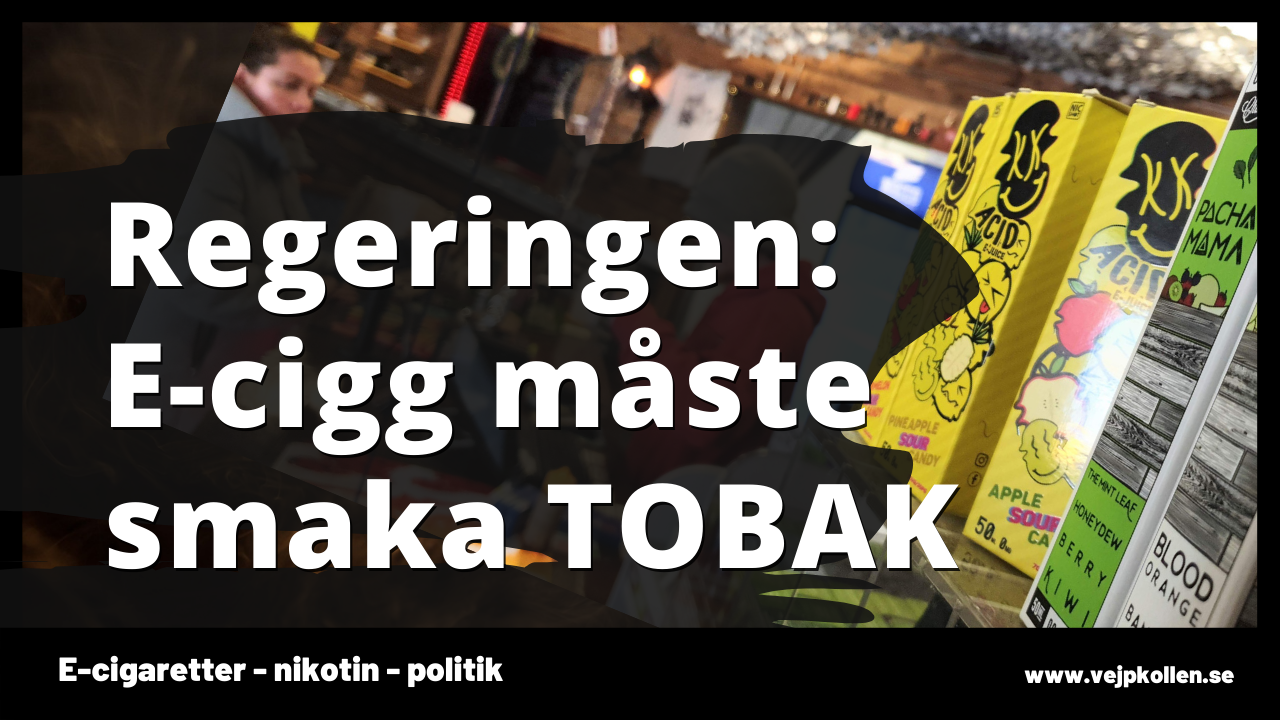Age limits for nicotine pouches but a ban on flavours for e-cigarettes. This is the content of the government's new legislative proposal to reduce the use of nicotine in Sweden. However, the government chooses to still allow the sale of regular cigarettes.
It is now clear that the Swedish government wants to ban virtually all flavours in e-cigarettes and e-liquid. From 1 January 2023, all flavoured e-liquids, including nicotine-free ones, must have a distinct tobacco smell and taste. If the Parliament says yes to the new law.
"Liquids intended to be consumed through electronic cigarettes shall not be made available to consumers on the market if the liquids contain additives that result in a clearly perceptible smell or taste of something other than tobacco." writes governments in its draft legislation "Tougher rules for new nicotine products", now submitted to the Legislative Council.
"Tobacco flavour is perceived as more dangerous"
As Vejpkollen revealed already in autumn 2020, the Social Democratic government, together with several interest groups, believes that all flavours in e-liquid in e-cigarettes should be banned. In March 2021, the the study that proposed that all flavourings that do not provide "a distinct smell and taste of tobacco" should not be allowed to be sold in Sweden.
"Among teenagers, taste is one of the most important factors for trying and continuing to use e-cigarettes. Tobacco-flavoured e-cigarettes are perceived as more dangerous by young people than fruit-flavoured or sweet-flavoured e-cigarettes." writes governments
85% prefer flavours other than tobacco
Half of all referral bodies have criticised the conclusions of the inquiry in various ways. Many say that a flavour ban will be difficult to implement and that such an intervention would have far too great consequences in relation to what the government wants to achieve. In addition, many believe that the restriction will favour the traditional cigarette trade.
"85% of adult users buy flavours other than tobacco flavours. There is a high risk that they will revert to smoking if the flavour ban enters into force," writes for instance the trade association for electronic cigarettes, BELC, in its consultation response.
Risk of increasing cigarette sales
According to a survey of e-cigarette users in Europe, more than a third of them would return to smoking if only tobacco flavour was sufficient. Several respondents also refer to a recently published study where smoking rates among young people increased significantly, compared to other, when the city San Francisco banned flavoured e-cigarettes, with the exception of tobacco flavours.
Law hits small businesses hard, says government
The impact on small business owners in the e-cigarette industry will be particularly difficult, especially for companies that only sell vejp products. This is something the government recognises.
"The proposal to limit the flavouring of liquids intended for consumption through e-cigarettes will have a negative impact on the market for such liquids. This applies to both nicotine-containing and non-nicotine-containing liquids. The proposals are likely to be particularly negative for smaller traders who find it more difficult to bear the costs that the proposals entail. However, the Government assesses that these effects can be more than justified by the fact that the proposals protect people from the harmful and addictive properties of nicotine, protect public health and make the products, whether they contain nicotine or not, less attractive to children and young people" writes government.
Larger companies or retailers that also sell cigarettes will, according to the government's assessment, be less affected by the new law. And according to several referral bodies, the law will rather lead to increased cigarette sales for these companies, as e-cigarettes become less attractive.
Fewer young people try e-cigs
The aim of the flavour ban is to curb experimentation with e-cigarettes by minors, those under 18 years of age. However, according to both the investigation and Central Information Centre for Alcohol and Drugs (CAN), the share of young people who try e-cigs (sometime in the last 30 days) has decreased since the 2019 peak.
'In 2019, 33 per cent of ninth graders reported that they had tried e-cigarettes at some point. In the second year of upper secondary school, 37 per cent had tried e-cigarettes in the same year. By 2021, this had decreased to 24 per cent of ninth graders and 35 per cent of upper secondary school students who had ever used e-cigarettes," the report notes. the government with reference to CAN.
17 per cent smoke occasionally
The proportion of secondary school students who smoke cigarettes, as sporadically as e-cigs, is 17 per cent. Several respondents point out that e-cigarettes do not seem to increase smoking among young people to any measurable extent.
E-cigs threaten government plans
According to Central Information Centre for Alcohol and Drugs, CAN, it is mainly young people who have previously experimented with or used cigarettes who try e-cigs. The main reason is curiosity (80) percent, but also different flavours such as fruit and candy flavours.
4% of them say they use e-cigs to quit smoking. This is too few to prevent restrictive legislation, according to the government. Moreover, e-cigarettes threaten to undermine the efforts the government considers important for public health.
"The attractiveness of e-cigarettes to young people means that there is a risk of them acting as a gateway to nicotine addiction. This in turn risks counteracting the efforts that have been made in the field of public health," writes the government.
Majority wants licences instead of bans
A majority of all consultation bodies believe that the government should introduce a licence requirement for the trade in e-cigarettes instead of a ban on flavours. This would mean that companies selling e-cigarettes must have a special licence to do so. According to several referral bodies, this would strengthen the protection of young people by reducing access.
"Not enough users"
But according to the government, there is no reason for a special licence. The reason is that the government thinks it would be too expensive in relation to how few people use e-cigarettes. The government also doesn't know whether young people's access to e-cigarettes is due to a lack of age control or trafficking between private individuals.
"E-cigarettes are still products that are used by relatively few people. Considering that the market for e-cigarettes and refill containers is relatively small, and that it is uncertain how great a need there is for increased control of sales, the Government considers that there are currently insufficient reasons to introduce a licence requirement. However, it is of great importance to protect children and young people from developing a nicotine addiction," writes the Government.
Very few young people vejpake regularly
According to CAN, less than 1 per cent of upper secondary school students use ecigs regularly (2019). The majority of these had previous smoking habits, CAN notes.
The corresponding figure for smoking was 6 per cent. Use among adults follows a similar pattern as among young people. At least in terms of regular use. About 2 per cent of adults use e-cigarettes - a third of them daily.
Will switch to tobacco flavours or import them?
Among adult e-cigarette users in the EU, surveys show that nearly 85% of daily e-cigarette users have quit smoking completely and replaced cigarettes with e-cigarettes.
The government recognises that adult users also prefer flavours other than tobacco, but that the ban will benefit children more than adults and is therefore acceptable.
"Some consumers are likely to switch to authorised liquids or to tobacco-free nicotine products that are still flavoured with non-tobacco flavours. Others are likely to stop using nicotine products. There is also a risk that there will be an influx of liquids with unauthorised flavours and aromas from other EU countries that have more generous rules," the report says. government.
Don't know how it will work
The government recognises that it does not know how the ban will work in practice.
"It will be necessary to make assessments of which additives give off or lead to e-liquids having an odour or taste of something other than tobacco. As several referral bodies opposed to the proposal state, the Government is aware that such assessments can be complicated. It can be emphasised that only those additives that are required for the function of the e-cigarette or that give the liquid a tobacco flavour should be permitted."
The government is entrusting municipalities, which usually carry out checks on e-cigarettes, to also check whether an e-liquid "smells and tastes like tobacco".
The bill has now been submitted for consultation to the Legislative Council. The Parliament will then vote on the new law. This will take place on 22 March 2022. If the law is passed, all flavours that do not 'have a distinct smell and taste of tobacco' will have to disappear from all shops. 1 January 2023.





No "tobacco-flavoured" e-juice "tastes or smells" of tobacco and definitely not of cigarette smoke. That is also the point, that most people want to get away from anything that might remind them of cigarettes. My experience is that no "tobacco flavour" tastes like tobacco, but few taste good. Stop shoehorning vejpning into the regulation of cigarettes! It gets more and more ridiculous. Like when politicians shoehorn vejphing into smoking bans. I've always been able to vejpat on outdoor terraces without any problems because it doesn't smell and doesn't bother anyone, for example. Flavour essences can be bought from France, the UK or Germany. Why oppose something that replaces cigarette smoking? A lot of it seems to come from the puritanical USA as well as the earlier "War on Drugs" and other bad policies. Stanton Glantz produces rubbish research and Mike Bloomberg funds, because a billionaire like him knows best how ordinary puffers should live their lives.